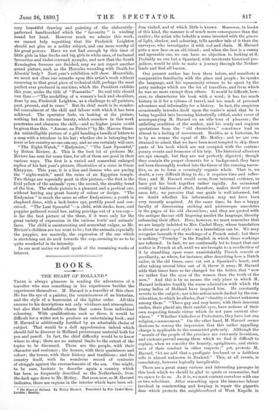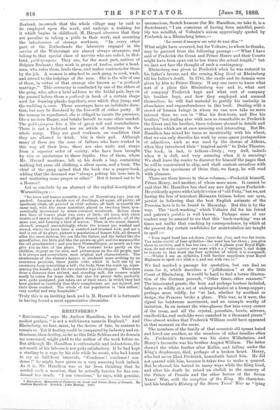BOOKS.
THE HEART OF HOLLAND.*
THERE is always pleasure in reading the adventures of a traveller who sees something in his experiences besides the experiences themselves. M. Havard is a traveller of this class. He has the eye of a painter, the reminiscences of an historian, and the style of a humourist of the lighter order. All this ensures to his descriptions not only vividness and atmosphere, but also that indefinable charm that comes from individual colouring. With qualifications such as these, it would be difficult for a writer not to produce an entertaining book ; and M. Havard is additionally fortified by an admirable choice of subject. That would be a dull apprehension indeed which should fail to discover in Holland picturesque material both for pen and pencil. In fact, the chief difficulty would be to know where to stop; there are no natural limits to the extent of the topics to be discussed. There are the people, with their character and costumes ; the houses, with their quaintness and colour; the towns, with their history and traditions ; and the country itself, with its wondrous record of centuries of struggle against the encroachments of the sea. One might, to be sure, hesitate to describe again a country which has been so frequently described as the Netherlands, from the dark ages down to Mr. Motley. But even now, as M. Havard indicates, there are regions in the interior which have been sel- 27,e Heart of Hollaxd. By Henry Haver& Translated by ?dm Cashel Hoey. London : Bentley.
dom visited, and of which little is known. Moreover, in books of this kind, the manner is of much more consequence than the matter; the artist who beholds a scene invested with the graces of light, shadow, and colouring, tells another tale of it than the surveyor, who investigates it with rod and chain. M. Havard puts a new face on an old friend ; and when the face is a sunny and agreeable one, we can have no objection to looking at it Probably no one but a Spaniard, with inveterate historical pre- judices, would be able to make a journey through the Nether- lands and find all barren.
Our present author has been there before, and manifests a comparative familiarity with the place and people ; he speaks the language, and his equanimity refuses to be upset by the petty mishaps which are the lot of travellers, and from which he was no more exempt than others. It would be difficult, how- ever, to characterise his book with a word ; it has too much history in it for a volume of travel, and too much of personal adventure and informality for a history. In fact, the suspicion occasionally intrudes itself upon the reader's mind that he is being beguiled into becoming historically edified, under cover of accompanying M. Havard on an idle tour of pleasure ; the unfailing erudition of the author, and his ready and copious quotations from the " old chroniclers," sometimes lead us almost to a feeling of resentment. Besides, as a historian, he is by no means the equal of Mr. Motley ; and we are con- strained to admit that we have been most tempted to skip those parts of his book which are not occupied with the contem- porary events and humours of his trip. The historical allusions are apt enough, but they are not perfectly digested ; though they contain the proper elements for a background, they have not been thoroughly worked into the tissue of the running narra- tive, so as to form a seemingly organic whole. That is, no doubt, a very difficult thing to do ; it requires time and reflec- tion ; and M. Havard would seem, from internal evidence, to have put his book together rather rapidly. An occasional crudity or baldness of effect, therefore, makes itself ever and anon felt; we perceive that our guide is well informed, but we doubt whether his information may not have been very recently acquired. At the same time, he has a happy faculty of discovering striking and picturesque anecdotes in the pages of his old chroniclers ; and they are quoted with the antique flavour still lingering amidst the language, thereby enhancing their effect. Here, however, we must remember that we are largely indebted to Mrs. Cashel Hoey, whose translation is about as good—quit style—as a translation can be. We may recognise beneath it the workings of a French mind ; but there is nothing " Frenchy " in the English in which those workings are reflected. In fact, we are continually led to forget that our author is French at all, until we are brought to a recollection of it by stumbling upon some unmistakably French conceit or peculiarity, as where, for instance, after describing how a Dutch sailor, in the old times, once cat out a Spaniard's heart, and after taking several bites out of it, threw it away, M. Havard adds that times have so far changed for the better, that " now we rather fear the eyes of the women than the teeth of the men." And this is by no means the only place in which M.. Havard indicates frankly the warm admiration with which the young ladies of Holland have inspired him. He constantly reverts to the subject ; nor is his ardour much dashed by the con- sideration, to which he alludes, that " chastity is almost unknown among them." " These gay and rosy lasses, with their innocent smiles, their placid air, their candid eyes, have notions of their own respecting female virtue which do not pass current else- where." " Whether Catholics or Protestants, they have but one religion,—amusement." On the other hand, M. Havard seems desirous to convey the impression that this rather appalling charge is applicable to the unmarried girls only. Although the "morals of the people of the province are extremely licentious, and customs prevail among them which we find it difficult to explain, when we consider the honesty, uprightness, and strict- ness of their conduct in other respects ;" yet, protests M. Havard, "let me add that a profligate husband or a faithless wife is almost unknown in Zealand." This, at all events, is: consolatory, however logically inexplicable.
There are a great many curious and interesting passages in this book which we should be glad to quote or summarise, had we space to do so. As it is, we must content ourselves with one or two selections. After remarking upon the immense labour involved in constructing and keeping in repair the gigantic dam which protects the neighbourhood of West Kapelle iu Zealand, insomuch that the whole village may be said to be employed upon the work, and undergo a training for it which begins in childhood, M. Havard observes that they are peculiar in taking a pride in their work, and resenting the interference of strange workmen. " In every other part of the Netherlands the labourers engaged in the service of the Waterstaat are almost always strangers, and belong to that special class of navvies who are called, in Hol- land, polderjongens. They are, for the most part, natives of Belgian Brabant ; they work in gangs of twelve, under a head- man, who rules them, leads them, and makes contracts for them by the job. A woman is attached to each gang, to cook, wash, and attend to the lodgings of the men. She is the wife of one of them, in virtue of that strange rite known as " a puthaak, marriage." This ceremony is conducted by one of the elders of the gang, who, after a brief address to the bridal pair, lays on the ground before them a puthaak (a hook of a certain shape used for drawing planks together), over which they jump, and the wedding is over. These marriages have an indefinite dura- tion, but may be dissolved by the free-will of either party. If the woman be repudiated, she is obliged to vacate the premises, like a modern Hagar, and betake herself to some other market. The polderjongens live a life of greLt toil and wretchedness. There is not a bedstead nor an article of furniture in the whole camp. They are good workmen, on condition that they are allowed to drink. Gin is their god. Although many of them are the sons of fathers who have worked in this way all their lives, there are also waifs and strays from a superior order of society, who have been brought by vice or misfortune to these depths. One of them, whom Mr. Havard mentions, left at his death a bag, containing nothing but some old clothing, a silver spoon, and a book. The chief of the gang opined that the book was a prayer-book, adding that the deceased was " always poking his nose into it, and muttering some prayer or other." But it turned out to be a. Horace !
Let us conclude by an abstract of the capital description of Wormeldingen
:- "Its trees and houses resemble a box of Nuremburg toys just un- packed. Imagine a double row of dwellings, all squat, all pretty, all spotlessly clean, all painted in vivid colours, all built in exactly the same way, with the same materials, placed in two long lines, sym- metrically intersected by straw-coloured woodwork. Before these two lines of houses plant two rows of little, old trees, with thick trunks and sparse foliage, all clipped, shaped, and pointed ; all of the same size, and forming a Lind of screen. Then, in the street, dusted, cleaned, scraped unremittingly, where the houses are washed and waxed, where the trees have a combed-and-brushed look, and not a leaf is out of its place, picture a population of honest folk, all dressed after the same fashion, the son like the father, and the father like the grandfather, the little girl like the grown-up girl, and the mamma like the old grandmother ; and you have 1Vormeldingen, as nearly as I can give you an idea of the place. The costume looks pretty on the children, elegant on the men, and picturesque on the old people, and it is always and everywhere most original and characteristic. The slenderness of the women's figures is rendered more striking by an enormous petticoat, three yards wide, which is held out by an enormous hoop resembling a bell ; the body, from the waist up, repre- senting the handle, and the two slender legs the clapper. When seen from a distance thus attired, and standing still, the women might easily be taken for large dolls, but also for pretty dolls, perfectly new, quite uninjured, just taken out of their cases, in which they had been packed so carefully that their complexions are not injured, nor their dress crushed. The whole of the population is bon enfant,' very cordial and very hospitable."
Truly this is an inviting land, and in M. Havard it is fortunate in having found a most appreciative chronicler.



































 Previous page
Previous page